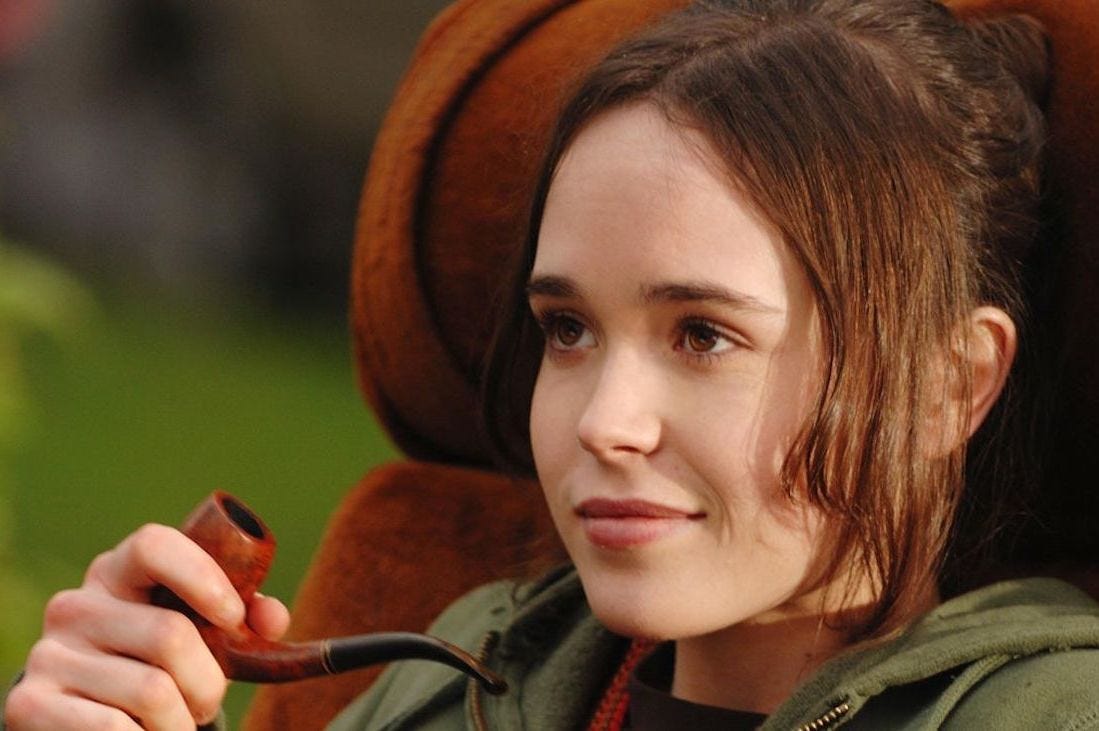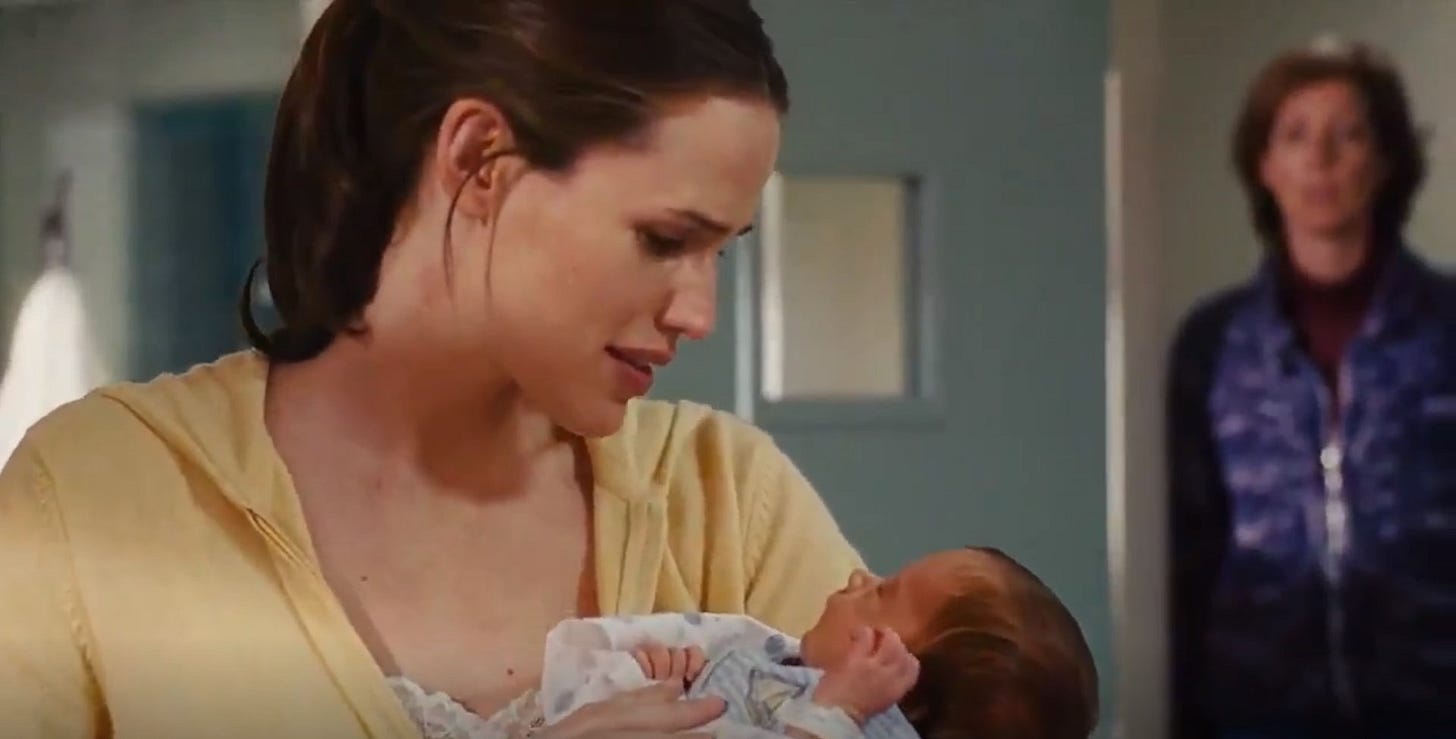I wanted to write about Juno this week for a couple reasons. The first is that I watched it (for the nth time) with a friend last week and was reminded, as always, of how much I love it. The second, as you have probably guessed unless you have never once met a trans person and haven’t heard of ‘the internet’, is that Elliot Page, the star of Juno, came out as trans on Tuesday. This news was met on trans twitter with a kind of euphoria I have never seen in the community, and made me personally extremely emotional. So it felt like it made sense for me to write about the movie which introduced me to Page, and which made me care so deeply about him and his work. This is a movie which I have watched probably more than any other movie — with the possible exception of The Lion King, which when I was a child and ill with croup I forced my sister to watch with me 2-3 times a day for a week — and which has always felt extremely close to me, like being at home. While it does feel slightly uncomfortable to be writing a piece about Page’s work from before their transition, I think it’s important to think about the reasons so many of us care so much about this news, and that can’t really be separated from the films he’s starred in, and especially, for me, Juno. And, similarly, it feels important to think about the movie’s central themes of solidarity, community, and love, which feel particularly urgent and relevant within the trans community of which Page is now a member.
When I was working out how to approach this I’d considered making a slightly tongue-in-cheek argument for Juno as a representation of trans pregnancy. I can sketch the argument I might have made: the film seems interested at times in how pregnancy might appear horrifying or weird or awkward, which could be a reflection of dysphoria — and at the least it seems frequently to want us to think about the ways pregnancy appears almost unnatural. The most jarring moment in the film is when Juno is told that ‘Someday, you’ll be back here [...] On your terms’; could the weird discordance of this beat invite us to think about and challenge this kind of biological determinism, what Juno’s ‘terms’ might be? At no point is it even suggested that Juno and the ‘biological father’ might wish to raise the child together. And Juno as a character seems generally to step outside what’s expected, and is described by the film’s representation of heterosexual normalcy (Bleeker’s mother) as ‘just different’; any on-screen relationship Michael Cera’s characters are in seems to have big t4t energy (admittedly this is with the sample size of this movie and Scott Pilgrim; I don’t watch many movies); etc.. This isn’t what I’m going to write, though. This is both because probably a thousand trans men who are both funnier and more qualified than me are currently racing to get it written, and because it’s not why I love the movie, and have loved it for an extremely long time.
(A note: I’m going to use she/her pronouns to refer to Juno, the character played by Elliot Page, from now on in this piece; other options just don’t make much sense to me when I’m not arguing that the character is or could be considered to be a trans man. Page’s gender doesn’t necessarily correlate to the characters he’s played. Where I talk about Page’s performance, I will of course use he/they pronouns to refer to him.)
I think one of the main reasons I love Juno is because it is a movie with extraordinarily little conflict. It’s possible I’m biased because I’ve watched it enough times to be able to predict every scene, but I basically always think that everything’s going to work out. Sure, Juno and Bleeker (the biological father of the child and Juno’s love-interest) have a falling-out — and Juno gets one of the greatest owns in cinema in, ‘I still have your virginity’ with Page giving this wonderful scoff/laugh while he delivers this incredible line — but it lasts like a couple scenes and the central point in their argument is their difficulty to resolve how much they care about one another. When characters are arguing about how to deal with the fact that they’re in love with each other it’s pretty easy to guess the end of the movie. While Juno finds pregnancy difficult, obviously, most of her complaints are about social perception and its impact on her jeans (which have to be elasticated). Her family are stressed by the pregnancy and seem potentially disappointed in her when she first tells them, but this generally falls away from consciousness — and, more importantly, it never feels like it will seriously damage their relationship.
Probably the biggest conflict we see in the film is around the true villain of the piece, Mark: originally going to be the adoptive father, he is shown to be extremely immature and unready for parenthood. After hitting on Juno (who is sixteen years old.) he is rejected (by the sixteen year old he attempted to recreate his high school prom dance with) and leaves his wife, moving to a loft presumably to pretend to be a teenage rock star again. I do not like Mark. However, even here it’s clear that Juno is unlikely to actually be romantically interested in him — the viewer has learned to trust her enough for that — and insofar as his leaving Vanessa represents an obstacle to a straightforward adoption, the solution is always obvious. And while he’s obviously a creep he’s not even particularly malevolent: the movie really just wants us to think of him as some horrible idiot child (does he even understand that he’s not the same age as Juno? Seemingly not: when Juno tells him ‘you’re old!’ he’s shocked and asks ‘how do you think of me?’).
I know arguing that a film is good because it’s not got any conflict in it is a slightly unusual argument to make. I know that conventionally we’re supposed to want ‘stakes’ and ‘drama’ and such things in our art, and occasionally Juno does feature them. But it’s not really interested in them other than when it’s necessary in order to have a plot; it’s interested in its characters, in how they build community with one another, in how they grow up. And there’s this deeply generous and capacious love which pervades Juno, with every character fundamentally loving one another in a deep and really kind way. While a lot of similar movies might look to restrict this love to the familial context — focusing on the ways in which Juno is loved and supported by her parents, for example — or to the romantic relationship betweenJuno and Bleeker, Juno keeps resisting this constraint. When I was watching it last week, my friend — who hadn’t seen the film before — mentioned how weird it was that Leah was in essentially every scene between Juno and her family, but I think this kind of reflects what the film is doing with its presentation of love. I’m not about to argue that Juno is family abolitionist, but it’s got a belief in how bonds of connection stretch beyond and outside of the family in a way which feels interesting and challenging and productive. Leah’s there so much because in a real way, in the world of Juno, she is part of Juno’s family.
I think the best example of this is the relationship between Juno and Vanessa. The film never shows us many scenes in which they form a bond, but their interactions frequently suggest a genuine intimacy and relationship of care between them. When Juno shows Vanessa her ultrasound, although she suggests to Mark she’s attempting to ‘defuse mom-type rage’, there’s this wonderful intimacy and closeness between the pair through this scene. The scene is shot such that it focuses almost exclusively on Vanessa and Juno as a pair, and when Mark enters it’s in a shot which passes over both Vanessa and Juno before looking between them at Mark. It attempts to really emphasise the bond and connection between the two, which is to an extent being formed here but also seems to already exist. When Vanessa hears the baby kick for the first time, Juno thinks nothing of allowing Vanessa to feel her stomach and Vanessa allows herself to be extremely vulnerable — even in the middle of a mall. While the scene’s purpose in the film is at least partially to show us how much Vanessa cares about motherhood and demonstrates how she attempts to build a bond with her unborn child, it also focuses on the connection between Juno and Vanessa — and it is implied, I think, that this is the moment which confirms to Juno that Vanessa is the right choice of adoptive mother. The scene feels, frequently, like it echoes the scene in which Juno and Bleeker first express their love for one another, but this love and connection is both between Vanessa and the baby and between Vanessa and Juno. In the world of Juno, it just makes sense that this bond would exist, because the space for love and mutually nourishing connections in the film is so vast.
At the end of the film, Allison Janney’s character Bren walks in to see Vanessa holding her child for the first time. It’s a wonderful scene, but doesn’t make much sense — it’s the first interaction we see between the characters, and we have no reason to believe they’ve met before. But they’re able to form a bond — or more precisely, perhaps, find a bond already there — in what’s a very short but extremely lovely scene. It’s only on the hundredth rewatch that I noticed it was a little odd, because it doesn’t feel out of place.
So I don’t think Juno is really a queer movie. But I think it’s one which feels particularly necessary at the moment, particularly at a time when our rights are being eroded and we’re having to fight to maintain a status quo which is already insufficient. It’s a film which suggests that the most urgent thing in the world is building bonds with others, acknowledging and embracing the reasons you’re already linked and tied to one another, and allowing yourself to grow together through those mutual connections. It’s about building a community and letting that sustain you. When Elliot Page came out, I hope he was as moved as I regularly am by the sheer strength, joy, and love of the trans community; I hope he feels enriched by the extraordinarily important connections between us all.
Thanks to Ambrose, Hanna, and Mia for their thoughtful comments and ideas on this, and particularly Mia for actually watching the thing with me and giving really detailed feedback on the first draft.







